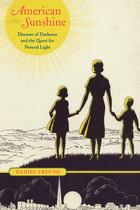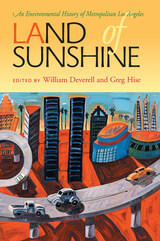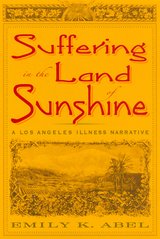
In the second half of the nineteenth century, American cities began to go dark. Hulking new buildings overspread blocks, pollution obscured the skies, and glass and smog screened out the health-giving rays of the sun. Doctors fed anxities about these new conditions with claims about a rising tide of the "diseases of darkness," especially rickets and tuberculosis.
In American Sunshine, Daniel Freund tracks the obsession with sunlight from those bleak days into the twentieth century. Before long, social reformers, medical professionals, scientists, and a growing nudist movement proffered remedies for America’s new dark age. Architects, city planners, and politicians made access to sunlight central to public housing and public health. and entrepreneurs, dairymen, and tourism boosters transformed the pursuit of sunlight and its effects into a commodity. Within this historical context, Freund sheds light on important questions about the commodification of health and nature and makes an original contribution to the histories of cities, consumerism, the environment, and medicine.

Most people equate Los Angeles with smog, sprawl, forty suburbs in search of a city-the great "what-not-to-do" of twentieth-century city building. But there's much more to LA's story than this shallow stereotype. History shows that Los Angeles was intensely, ubiquitously planned. The consequences of that planning-the environmental history of urbanism--is one place to turn for the more complex lessons LA has to offer.
Working forward from ancient times and ancient ecologies to the very recent past, Land of Sunshine is a fascinating exploration of the environmental history of greater Los Angeles. Rather than rehearsing a litany of errors or insults against nature, rather than decrying the lost opportunities of "roads not taken," these essays, by nineteen leading geologists, ecologists, and historians, instead consider the changing dynamics both of the city and of nature.
In the nineteenth century, for example, "density" was considered an evil, and reformers struggled mightily to move the working poor out to areas where better sanitation and flowers and parks "made life seem worth the living."
We now call that vision "sprawl," and we struggle just as much to bring middle-class people back into the core of American cities. There's nothing natural, or inevitable, about such turns of events. It's only by paying very close attention to the ways metropolitan nature has been constructed and construed that meaningful lessons can be drawn. History matters.
So here are the plants and animals of the Los Angeles basin, its rivers and watersheds. Here are the landscapes of fact and fantasy, the historical actors, events, and circumstances that have proved transformative over and over again. The result is a nuanced and rich portrait of Los Angeles that will serve planners, communities, and environmentalists as they look to the past for clues, if not blueprints, for enhancing the quality and viability of cities.

The history of medicine is much more than the story of doctors, nurses, and hospitals. Seeking to understand the patient’s perspective, historians scour the archives, searching for rare personal accounts. Bringing together a trove of more than 400 family letters by Charles Dwight Willard, Suffering in the Land of Sunshine provides a unique window into the experience of sickness.
A Los Angeles civic leader at the turn of the twentieth century, Willard is well known to historians of the West, but exclusively for his public life as a booster and reformer. Willard’s evocative story offers fresh insights into several critical issues, including how concepts of gender, class, and race shape patients’ representations of their illness, how expectations of cure affect the illness experience, how different cultures constrain the coping strategies of the sick, and why robust health is such an exalted value in certain societies.
READERS
Browse our collection.
PUBLISHERS
See BiblioVault's publisher services.
STUDENT SERVICES
Files for college accessibility offices.
UChicago Accessibility Resources
home | accessibility | search | about | contact us
BiblioVault ® 2001 - 2024
The University of Chicago Press









